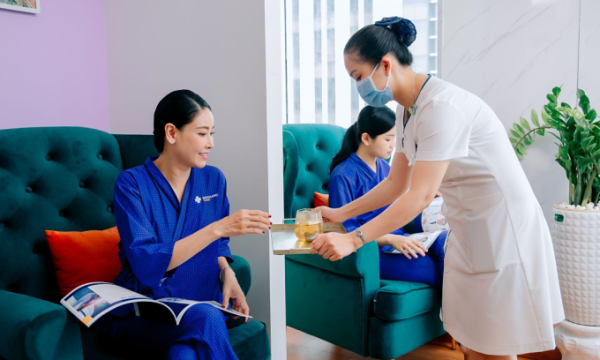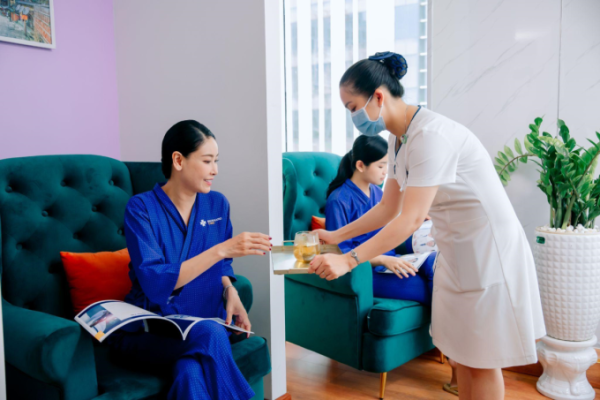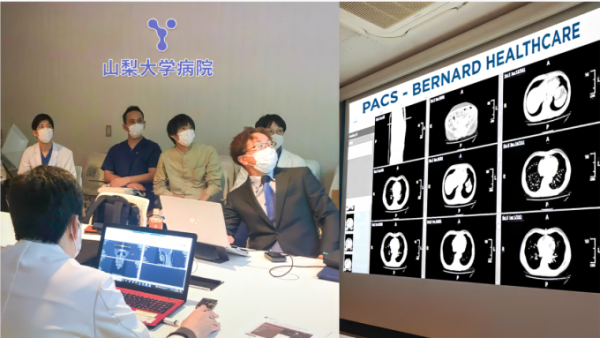
At the 65th Annual Meeting of the Japan Society of Ningen Dock and Preventive Medical Care, held at the Pacifico Yokohama Meeting Center in Japan on Septe. 6-7, Bernard Healthcare gave an oral presentation about the inauguration of Ningen Dock in Vietnam.
The meeting serves as a forum for sharing and discussing the latest findings in healthcare and preventive medicine. The event attracted 4,300 participants, including 3,800 in-person attendees, with 277 oral presentations and 167 poster presentations. It provided a valuable opportunity to share the latest advancements in physical health and preventive care while pointing to the future growth of this field, especially as preventive medicine continues to gain importance.
At the meeting, Bernard Healthcare had the opportunity to meet Dr. Ishizaka Yuko (MD, PhD), Vice President of the Japan Society of Ningen Dock and Preventive Medical Care, Chair of the Meeting, and discussed the six key differences between Ningen Dock and regular health checkups.
Scope and depth
Ningen Dock is a comprehensive health checkup program designed to detect potential health issues at an early stage. It includes clinical examinations, blood tests, imaging (MRI, CT scans, ultrasound), endoscopy, cardiovascular assessments, cancer screenings, and lifestyle evaluations. The objective is to provide an in-depth analysis of the patient’s health, going beyond basic examinations to identify diseases before symptoms appear.
In contrast, regular health checkups typically consist of basic tests such as blood pressure measurements, simple blood tests, urine analyses, and general examinations (heart and lungs). These are designed to monitor overall health and identify urgent issues but lack the comprehensiveness of the Ningen Dock program.
|
The Ningen Dock Bernard includes extensive imaging diagnostics. Photo courtesy of Bernard Healthcare |
Customization
Ningen Dock can be tailored to the patient’s age, medical history, lifestyle, and specific concerns. The programs can focus on particular health risks, such as cancer, heart disease, or digestive issues. Regular checkups, on the other hand, follow a standard set of tests and procedures, with customization limited to health concerns raised by the patient or physician.
Duration of examination
Ningen Dock examinations typically last from half a day to two days due to the extensive range of tests. Some programs even offer accommodations and spa services as part of the experience. In contrast, a regular checkup usually lasts only a few hours or less, depending on the number of tests conducted.
Focus on preventive medicine
Ningen Dock emphasizes preventive care and the early detection of diseases, particularly cancer, cardiovascular issues, and lifestyle- conditions. The goal is to identify illnesses at their earliest stages when treatment is most effective.
The package also includes consultations with physicians to explain results. In contrast, regular checkups primarily focus on identifying current health issues or monitoring chronic diseases. They are generally less proactive in disease prevention and often lack detailed explanations from doctors.
 |
|
Some Ningen Dock programs offer accommodations and spa services as part of the experience. Photo courtesy of Bernard Healthcare |
Costs
Ningen Dock checkups more expensive due to the broad scope of testing and the personalized approach. They are considered a premium healthcare service. In contrast, regular checkups are more affordable. In Vietnam, both services are not covered by insurance.
Target audience
Ningen Dock health checkups are recommended for individuals seeking comprehensive, preventive assessments or those with a family history of serious illnesses. It is particularly popular among middle- to higher-income individuals looking for peace of mind or more thorough risk management than standard health guidelines provide. Regular checkups are suitable for the general population as part of routine health maintenance.
 |
|
As part of this collaboration, the University of Yamanashi Hospital will provide cross-checks on MRI and CT results (second opinions) for clients at Bernard Healthcare. Photo courtesy of Bernard Healthcare |
In Vietnam, Bernard Healthcare is one of the first private healthcare institutions to implement the Ningen Dock health checkup model with the professional support of the University of Yamanashi Hospital in Japan, in addition to offering regular checkup services.
In Vietnam, Bernard Healthcare is one of the first private medical institutions to join the Japan Society of Ningen Dock and Preventive Medical Care. It has been implementing this renowned health check-up model since February 2021, with a clear mission, early detection and screening, timely treatment, and promoting lifestyle changes for better health.
Bernard’s Ningen Dock program offers a comprehensive and in-depth health check-up package, modeled after Japan’s 70-year tradition of excellence. It includes a full spectrum of tests ranging from basic to advanced, functional assessments, and state-of-the-art imaging techniques such as Magnetic Resonance Imaging (MRI), Computed Tomography (CT) scans, ultrasound, and sedation endoscopy. These methods are designed to detect early risks of cancer, stroke, and lifestyle- diseases like cardiovascular issues, diabetes, and obesity.
MRI and CT scan results undergo cross-checking by a team of radiologists and cancer specialists from the University of Yamanashi Hospital in Japan. In the case of abnormal findings, Bernard initiates a multidisciplinary consultation process involving both local and Japanese experts.
Furthermore, it offers continuous support to patients and their families, collaborating with leading hospitals in Japan for follow-up care.